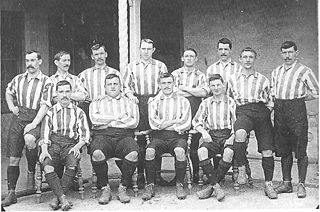Related Research Articles

Sheffield United Football Club is a professional football club in Sheffield, South Yorkshire, England, that competes in the Premier League, following their promotion from the 2022–23 EFL Championship. They are nicknamed "the Blades" due to Sheffield's history of cutlery production. The team have played home games at Bramall Lane since their formation. For most of the club's history, United have played in red and white striped shirts with black shorts. Their main rivals are Sheffield Wednesday, with whom they contest the Steel City derby.

Lee Andrew Hendrie is an English former professional footballer and pundit for Sky Sports.
Michael Wadsworth is an English football coach and former player.
Patrick Anthony Olozinka Agana is an English former professional footballer who played as a striker.
John Thomas Alderson was an English professional footballer who played as a goalkeeper, making one appearance for the full England national team.

Christopher John Wilder is an English professional football manager who formerly played as a right-back. He was most recently the manager of EFL Championship club Watford.

Henry Thickitt was a professional footballer and Manager. Born in Hexthorpe, Doncaster he played as a defender primarily for Sheffield United with whom he won the First Division once, the FA Cup twice and gained two caps for England. He then went on to achieve relative success as the manager of Bristol City.
Ellis Hall was an English footballer who played for Hull City, Stoke, Huddersfield Town, Hamilton Academical and Halifax Town.

Walter Edward Boyes was an English footballer who earned three caps for the national team between 1935 and 1938. He played club football for West Bromwich Albion, Everton, Notts County and Scunthorpe United.
Charles Bunyan Sr. (1869–1922) was an English professional football player and manager active throughout Europe in the late-19th and early-20th centuries.
George Renger Dewis was an English footballer who played as a centre forward in The Football League between the 1930s and 1950s. Born in Burbage, Leicestershire, he spent the majority of his career with Leicester City, whom he returned to once he retired from playing, becoming part of the coaching staff. Dewis also spent a brief time at Yeovil Town and appeared as a guest player for a number of clubs during World War II.
Harold Buddery was an English footballer who played for Portsmouth in the Football League and also had spells with Doncaster Rovers, Southend United and Rotherham Town.
The 1889–90 season was the first in existence for Sheffield United. Having not been elected to any organised league at that point they predominantly played friendly fixtures but did enter the FA Cup for the first time as well as locally arranged cup competitions The Sheffield Challenge Cup and the Wharncliffe Charity Cup. The club did not employ a manager in this period; tactics and team selection were decided by The Football Committee and the players were coached by a trainer. J.B. Wostinholm held the position of club secretary, dealing with player transfers and contracts, arranging matches and dealing with the FA. The first season was deemed a reasonable success with steady attendances to home games and progress in the FA Cup although the fluctuating nature of the team meant that consistency was never really achieved.
The 1890–91 season was Sheffield United's second, and their first and only season playing in the newly formed Midland Counties League, as the club sought to establish itself as a major footballing force. The team was selected by the club's football committee and coached by a trainer, but day-to-day affairs were overseen by club secretary Joseph Wostinholm. The club saw a large influx of players during the season as it continued to bolster its numbers with amateurs loaned or signed from other teams in the local area, a policy that resulted in an unsettled side, indifferent league results, and a mid-table finish.
The 1891–92 season was the third in existence for Sheffield United. This was their first season playing in the recently formed Northern League as the club sought to establish itself as a major footballing force. The Blades had a reasonably successful season, finishing third in the league, and registering some comprehensive victories along the way. They improved on the previous season by reaching the second round proper of the FA Cup and were victorious in the local cup competitions, winning both the Sheffield Challenge Cup and the Wharncliffe Charity Cup for the first time.
Clarrie Jordan was an English professional footballer who played as a centre forward for Upton Colliery, Doncaster Rovers and Sheffield Wednesday. He holds the Doncaster record of 42 league goals scored in one season, and jointly holds the record of scoring in 10 consecutive games in the Football League.
The 1892–93 season was the fourth in existence for Sheffield United. This was their first season playing in the recently formed Football League Second Division as the club sought to establish itself as a major footballing force. With some members of the football committee unconvinced of the long-term future of the Football League, the club also retained its membership of the Northern League.
Ernest Milton was an English footballer who played as a left or right back for Sheffield United in The Football League. Born in Kimberworth near Rotherham, he also had a spell for Kilnhurst Town as well as guesting for Birmingham, Rotherham County and Barnsley during World War I.
George Edward Laking was an English footballer who played in the Football League for Wolverhampton Wanderers and Middlesbrough. Born in Harthill, England he also played for a number of clubs in non-league and guested for several other clubs during World War II.
George Horace Henson was an English footballer who played in the Football League for Bradford Park Avenue, Northampton Town, Sheffield United, Swansea Town and Wolverhampton Wanderers.
References
- 1 2 Denis Clarebrough & Andrew Kirkham (2008). Sheffield United Who's Who. Hallamshire Press. p. 52. ISBN 978-1-874718-69-7.